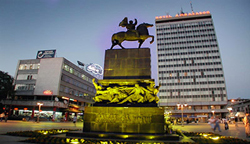
The media scene in Nis
Nis frontlines

"It's springtime, and I live in Serbia" was one of the slogans during the civil protests in the once capital of democracy in the south of Serbia. I often think about this graffiti from Nis whenever someone asks me about the state of the media today. Well, do you really need to ask? We are still in Serbia. It sounds so distant from my experience when some of my colleagues or media experts mention the media strategy or harmonization with European media standards. As if it is going to happen in the next 50 years, when I will have nothing to do with it. Then I wonder how all this sounds to citizens of Nis, those who watch, listen or read some of the 20 media outlets that exist to serve them? Perhaps they think that someone is kidding them. It seems illogical, but it is true. They are aware that their televisions, radio stations and a single daily (the only one that goes to print south of Belgrade) are impoverished and fighting for survival... Citizens of Nis understand this while they watch, listen or read their media outlets. But does the government understand? Obviously not – because the government has announced a contest for more TV and radio stations than Nis needs (no less than 9 TV stations in Nis!), because it has not privatized municipal media outlets (all of them or none at all), because pirate stations still exist, because cable and terrestrial TV stations have not been regulated, because the government has not given assistance to the local media to help them weather the crisis (I am sure that no one believes that the last year's media support package by the Government of Serbia was successful!?), because it has not ensured fair competition in the market for everyone... Taking all these factors into account, how can we even consider any standards in the media sector? I don't want to even mention the government's attitude toward the local media, the same local media that have offered support to civil protests, the fight for democracy and media freedoms. At the time, there were no national broadcasters of today, but there were many "small" radio and TV station that were of great use to those who comprise the today's government. Whenever I mention this (as an aside, and when sentimentality overwhelms me) to Nis politicians, their response is – "well, you wanted democracy and the free market". Yes, we wanted it, but we wanted fair play as well.. The economic crisis has struck the final blow to the Nis media, painfully throwing them to their knees. Did you know that the total advertising on the local media in Serbia during the last year fell by 40% as compared to 2008? Almost by half. Have the expenses been cut in half? Is there anyone left who doubts that the desperate financial situation in the media suits the politicians just fine? The media in Nis, although most of them are in the same unenviable position, are not all on the same side. Why? Because of the simplest of reasons – money. This is how the stage looks like. The players are TV5, TV Zona, TV Belle Amie (regional TV stations), NTV (the non-privatized station has signed the Kragujevac Initiative), TV Kopernikus and TV Banker, daily newspaper Narodne novine, Radio City, Media Center Nis and the website Juzne Vesti. These are the main actors in a telenovela, while all other media outlets play only supporting roles (because they lack any kind of a news content worth mentioning, which prevents them from participating in the main arena). All of them have been hit by the crisis and all of them need money. Where are they going to find it, if the advertising pool has already shrunk by 40%? The only remaining source is the local community i.e. the city of Nis. All kinds of conflicting arguments are flown around: the city is already financing the NTV with more than 35 million dinars a year (which has become a kind of a burden to all – the employees of the TV station, the city administration, as well as the citizens, who occasionally get reminded of what kind of an initiative they have signed); the city has no more money available in this year; the city has "special obligations" toward some of the media outlets; the city does not want to "sign a death penalty" to certain media outlets; the mayor is of the opinion that the media in Nis do not engage in investigative journalism but copy from the national media (?!); there are "contracts with public companies"... Any more than this and we would have a true telenovela. And as it has happened, I play one of the main roles in it!
The saddest thing of it all is the fact that the winners in this unfair struggle can hardly be the best of them all (i.e. the most balanced, professional, highest-rated...). Because it costs money. It is not easy when there is no concept, no market, and no media strategy. Well, the strategy should be here really soon! I mean, seriously, it will be ready in July 2010.
Aneta Radivojevic
MC Newsletter, July 2, 2010
View all comments (0) Leave a comment
Published comments contain opinions that are not the opinions of Media Center. Responsibility for the content of messages and their accuracy lies on the website users who posted them.
 |
| The content of this article does not necessarily reflect the view of the Media Center. The author bear full responsibility for the content of the text. |




